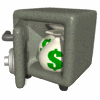|
|
|
 Let’s say you have money that you want to stash away for awhile and you want to earn more than you would in a typical checking or savings account. Let’s say you have money that you want to stash away for awhile and you want to earn more than you would in a typical checking or savings account.
Perhaps you’re saving for a rainy day, building up an emergency fund of 3-6 month’s worth of salary, or saving up for a down payment on a house or other big purchase. You want that money to earn interest, and you want it to be safe. You also want to be able to get at it in case you need it.
 In financial terms, this money is called a cash reserve asset. Like cash, the money you have in a cash reserve asset is liquid which means you can spend it, it’s not tied up in an investment or other account that you can’t access, and it is in no danger of being lost in a risky investment. In financial terms, this money is called a cash reserve asset. Like cash, the money you have in a cash reserve asset is liquid which means you can spend it, it’s not tied up in an investment or other account that you can’t access, and it is in no danger of being lost in a risky investment.
Credit unions and banks have come up with ways for you to keep your money safe and liquid, while still letting it earn more interest than it would in an interest-bearing checking or savings account.
Money Market Accounts (MMA) are for people who want to “park” money but still be able to access it when needed. These accounts are marketed with different names such as Money Management Account, Investor’s Choice Account, Money Market Plus Account and so forth but they are all basically the same thing.
|
MMAs usually have minimum balances that can vary widely. If you keep a higher balance, say over $10,000, the interest rate you’ll earn may be higher. Watch out for accounts that charge a fee if you don’t maintain a minimum balance.
 In accordance with federal regulations, you are limited to six withdrawals (including preauthorized transfers and transfers to cover overdrafts in other accounts) per month and no more than three of these can be by checks. In accordance with federal regulations, you are limited to six withdrawals (including preauthorized transfers and transfers to cover overdrafts in other accounts) per month and no more than three of these can be by checks.
Sometimes the checks must be over a minimum amount, say $200. If you write more than the allowed number of checks, you might wind up paying a penalty, like $10 a check. Some MMAs may come with an ATM card.
 Remember, your goal is to build up this nest egg, so withdrawals shouldn’t be an issue. Instead, consider regularly transferring money into your MMA. Remember, your goal is to build up this nest egg, so withdrawals shouldn’t be an issue. Instead, consider regularly transferring money into your MMA.
Money Market Accounts from credit unions and banks are insured up to $250,000 through the Federal Deposit Insurance Corporation (FDIC) or National Credit Union Administration (NCUA), so they are a safe choice for your savings.
|
|
|
|
|
 Rates on MMAs are based on the market interest rates, which can go up or down. When you open a Money Market Account, the financial institution is required by law to tell you its Annual Percentage Yield (APY) and explain the rules of minimum balance, check writing, and so forth. The APY is what you'll receive provided you leave your money in the account for a full year. Rates on MMAs are based on the market interest rates, which can go up or down. When you open a Money Market Account, the financial institution is required by law to tell you its Annual Percentage Yield (APY) and explain the rules of minimum balance, check writing, and so forth. The APY is what you'll receive provided you leave your money in the account for a full year.
Money Market Accounts first began in the 1970s as a response to Money Market Funds (MMF), which were offered by mutual fund companies. At that time, there was a lot of inflation, and MMFs were paying over 15%, while banks and credit unions were limited by the government to paying 5.5% on savings accounts. These financial institutions lobbied Congress to let them offer Money Market Accounts, too.
Money Market Funds (sometimes called money market mutual funds or money funds) may sound similar to Money Market Accounts, but they are very different.
MMFs are offered by some financial institutions, brokerages, and mutual fund companies, and are commonly used by people with brokerage accounts who sell a stock and then put the proceeds into a MMF until the money is reinvested.
 Money Market Funds are not insured, but in exchange for taking on this risk with your liquid savings, you may be able to earn a better rate than most Money Market Accounts. Money Market Funds are not insured, but in exchange for taking on this risk with your liquid savings, you may be able to earn a better rate than most Money Market Accounts.
|
Don't worry. MMFs are highly regulated and invest in very safe, short-term debt securities, such as certificates of deposit (or share certificates), and U.S. Treasury bills.
 Most Money Market Funds (like MMAs) allow you to write checks and make electronic transfers, but most establish a minimum dollar amount. Most Money Market Funds (like MMAs) allow you to write checks and make electronic transfers, but most establish a minimum dollar amount.
Check with your institution to see if it imposes a fee after a certain number of withdrawals if your account balance drops below a certain level.
The main fees associated with a money fund are the expense ratio, transaction costs, low balance fees and sometimes a fee that is charged if you sell your shares before a specified amount of time.
 You can compare different MMFs by searching the Internet. Money funds advertise their seven-day average yield. If you choose an account or fund that is in a different city than yours, you’ll have to deposit or withdraw money by using ATMs, wire transfers, or by mailing checks. You can compare different MMFs by searching the Internet. Money funds advertise their seven-day average yield. If you choose an account or fund that is in a different city than yours, you’ll have to deposit or withdraw money by using ATMs, wire transfers, or by mailing checks.
So even if you’re saving for a rainy day and the amount you’ve saved doesn’t seem like a lot, it’s worth placing your money in an account that will make the most of your hard-earned money. With MMAs and MMFs, you have access to liquid funds and the convenience of making deposits and withdrawals. 
See what you learned.
Check out "The Feeling is Mutual, Funds That Is" and "Not Just for Music: CDs"
|
|
         
|
Did this answer your question?